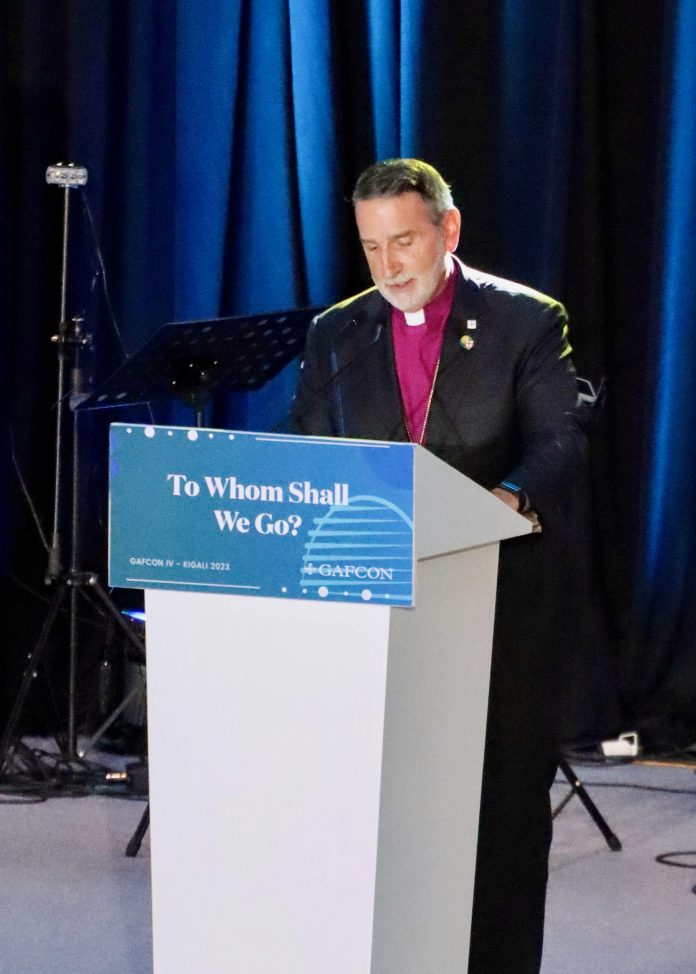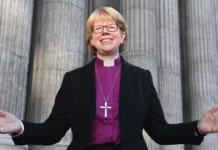GAFCON IV will not spend five days bemoaning the failures of the Church of England, but is focused on recalling the wider Anglican world to renewal, revival and reform, the chairman of GAFCON the Most Rev. Foley Beach indicated in his presidential address tonight.
Meeting at the Kigali Convention Center in Rwanda, the opening session of the 17 – 21 April 2023 meeting featured entertainment from a local choir and dancers, and addresses by the host, the Most Rev. Laurent Mbanda, Archbishop of Rwanda, the general secretary of GAFCON, the Most Rev. Ben Kwashi, the prime minister of Rwanda, Édouard Ngirente, and Archbishop Beach.
In a powerful address that was interrupted by applause in several places, Archbishop Beach began his address noting the five years since the last GAFCON meeting in Jerusalem had been difficult for the church. Covid-19 “shut down our ministries,” he said, adding that “many faced persecution,” “famine, drought, flooding, war and civil unrest” prompting him to wonder if GAFCON would survive.
However, “when God ordains something he sees it through,” he declared, stating GAFCON IV “may be one of the most important church gatherings in our time.”
“God had his hand on GAFCON,” he said, and was blessing the movement for “standing against those who conveniently or culturally stand against the word of God.”
The archbishop then turned to the core of his address, speaking about the “four marks of a continuing spirit filed movement:” a repenting church, a reconciling church, a reproducing church, and a relentlessly compassionate church.
“We” Anglicans “can go on playing church, being religious, and even making statements that make no spiritual impact on our world.” However, the desire of Christians today is to see “revival break out and spread to every part of the world.”
A repenting church was one that modeled the Lord’s call for all people to repent of their sins. It served no purpose to call out the sins of others if we ignored our own sins and shortcomings, he explained. The Holy Spirit “reveals” to a believer their sins, giving you a choice to turn away or to continue in sin.
Here the archbishop made his only comment on the situation facing the Church of England – not as a rallying cry for action, but as an example of reprobate behavior. He stated: “In recent days we have seen the Church of England led by the Archbishop of Canterbury walk away from the plain teaching of Scripture. We call on them to repent, to return to the teaching of the word of God. We call on them to stop blessing sin and return to the sanctity and holiness of marriage.”
He then called out the Scottish Episcopal Church, the Church in Wales, the Episcopal Church of Brazil, the Anglican Church of New Zealand, the Church of Australia, the Anglican Church of Canada, and the Episcopal Church of the USA to “repent and turn to the teachings of Holy Scripture.”
“Sadly,” he observed, “and with broken hearts, we say that until the Archbishop of Canterbury repents we can no longer recognize him as the first among equals and the spiritual leader of the Anglican Communion.”
“It is time for the whole Anglican establishment to be reformed,” he declared, and then asked “Why does the secular government of only one of the nations represented in the Anglican Communion still get to pick the spiritual leader of the Anglican Communion? This makes no sense in today’s post-colonial world.”
Archbishop Beach then turned to the question of personal and corporate holiness, speaking as forcefully and at equal length to “our provincial sins, our church’s sins, our personal sins,” as “some things we do are not of God.” We must repent.
A reconciling church was not a church that was reconciled to the world, or to sin, but first to God “based on the truth of the Scriptures.” Archbishop Beach argued “real reconciliation” needs to “remove the source of the quarrel, the root cause” of the hostility and anger between people. There could be “no reconciliation, without repentance,” he concluded.
A reproducing church was a church that consciously sought to make disciples and tell the whole world about the saving grace and love of Jesus Christ, he noted. A relentlessly compassionate church was one driven by the love of God to love one’s neighbor. “The love of God compels me” to love my neighbor, he argued.
While some of his examples touched upon the dysfunction within the Church of England, the tenor of the archbishop’s address dealt with the overarching call of repentance, renewal and revival. The agenda set out by the conference is likely to include a statement or call for action in response to the February decision by General Synod to bless same-sex marriage. However, Archbishop Beach made it clear the Anglican world had move beyond England and was now focused on all peoples, cultures and races around the globe.
The conference continues.




[…] Read it all. print […]